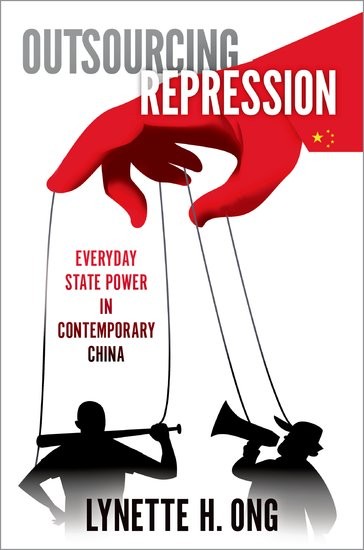WEAI Author Q&A: Lynette Ong on "Outsourcing Repression"

We are excited to announce a new title in the Studies of the Weatherhead East Asian Institute book series: Outsourcing Repression: Everyday State Power in Contemporary China, published by Oxford University Press. The book's author Lynette Ong is associate professor of political science at the Munk School of Global Affairs and Public Policy at the University of Toronto.
In Outsourcing Repression, Lynette H. Ong examines how the Chinese state engages nonstate actors, from violent street gangsters to nonviolent grassroots brokers, to coerce and mobilize the masses for state pursuits, while reducing costs and minimizing resistance. She draws on ethnographic research conducted annually from 2011 to 2019--the years from Hu Jintao to Xi Jinping, a unique and original event dataset, and a collection of government regulations in a study of everyday land grabs and housing demolition in China. Theorizing a counterintuitive form of repression that reduces resistance and backlash, Ong invites the reader to reimagine the new ground state power credibly occupies. Everyday state power is quotidian power acquired through society by penetrating nonstate territories and mobilizing the masses within. Ong uses China's urbanization scheme as a window of observation to explain how the arguments can be generalized to other country contexts.
We thank Dr. Ong for taking the time to discuss her book with us.

Q: First could you please introduce yourself and your research interests?
I am Professor of political science at the University of Toronto. I study primarily China, and also other Asian countries, such as Southeast Asia and India. My research interests sit at the intersection of authoritarianism, contentious politics and the political economy of development, which makes China such a fascinating case to study.
Q: How did you first become aware of the engagement of nonstate actors in pursuing state goals?
Outsourcing Repression is a culmination of nearly a decade (2011-19) of field research. The nonstate actors whom I examine in the book – thugs-for-hire and grassroots brokers – are by no means a recent phenomenon in China. However, the existing academic literature has either paid no attention to them, taken them for granted, or treated them as part of the state. I argue in the book that by separating the layers of state and society, we can eke out the nonstate actors who lie in between them. And, by putting them under the microscope, we can learn new things about how China and other authoritarian states exercise control over society.
On my first field trip in Anhui Province in 2011, I started off trying to understand the political economy of urbanization—a continuation of the theme from my last book, Prosper or Perish: Credit and Fiscal Systems in Rural China [Cornell University Press, 2012]. However, as I spoke to ordinary folks who were undergoing or had undergone land-grabbing and housing demolition, they were eager to share with me tales of harassment by local thugs and hoodlums. I felt compelled to learn more about it, and then switched the focus of my academic inquiry to repression or social control, from the original political economy focus. Later, as I moved to field sites away rural to urban China, and away from the inland to coastal cities, I came across the prevalent grassroots brokers and learnt about their pertinent roles in everyday policy implementation.
Q: You mention that the use of nonstate actors gives the state plausible deniability when force is used, for example. How clear is the connection between these actors and the state, and how does this arrangement between the state and nonstate enforcers work in practice? [Are the brokers and “thugs for hire” given explicit directives? Are the people being made to acquiesce aware of the connection to the state?]
The violent nonstate actors, whom I call “thugs-for-hire” are loose gangs of individuals who are unemployed or do not have regular jobs. They are willing to sell their muscle power for a profit. They are hired to carry out demolition projects, and dismissed when the projects are completed. Citizens being repressed may or may not know they are being hired by local governments. But, the fact that they are unidentified agents provide the hiring authority with plausible deniability and opportunities to evade responsibility.
The relations between local authorities and thugs-for-hire can be thought of as principal-agent relationship. When the principal or local governments hire an agent, he must have control over whom he hires, and makes sure the agent does not use excessive violence that will cause unnecessary casualties. It is also important that violent repression is carried out covertly or away from public scrutiny. On rare occasions that these conditions are not met, the benefit of plausible deniability offered by outsourcing repression is being denied at the outset. The central or higher-level governments may also step in to punish the local authority or find a scapegoat when the Party’s reputation is put at stake due to the casualties. In the detailed case studies in Chapter 4, I described the circumstances under which these conditions were not met, and the implications for the local hiring authorities in Shanghai, Kunming and Zhengzhou.
Q: Outsourcing Repression focuses on mobilizing the masses to spearhead urbanization goals, but you also mention that this strategy is used for intimidating protestors and dissidents, among other applications. Why are these nonstate actors willing to do the state’s bidding, often working against their fellow citizens?
Among the three types of grassroots brokers – political, social and economic brokers – I examine in the book, social brokers are the most effective in mobilizing the masses. Social brokers, who are volunteers with no state affiliation, are mobilized by the state to persuade citizens to comply with state directives, and in this case, sign consent papers. State mobilization of social brokers is conducted through ideological or normative value of volunteerism, and material rewards. In Maoist times, the Party could mobilize social brokers by firing up their ideological fervor. In post-Mao China, the state needs to provide them with material incentives.
In cases of housing demolition, material incentives can take the form of early-bird bonuses whereby families with individuals who command strong social legitimacy are given “carrots” to sign their consent papers. Then, they have the incentives to mobilize the masses to do the same. For every family they have persuaded, they are given more benefits. Social brokers are more effective in eliciting compliance from the citizens because they leverage on their social capital, derived from long-term service in the community. They are more trusted by the community than political brokers, such as residents’ committee members, who derive their power from state appointment or affiliation.
Q: You also offer a comparative context, looking at India and South Korea, and even note some linkages to Russia. What makes the Chinese case unique, and what lessons do these other country cases offer?
The Chinese state under the rule of the Chinese Communist Party has a strong state and weak society, reversing the earlier trends of weak states in the KMT period and late Qing dynasty. In a principal-agent relationship, a strong state is better able to control its agents, making sure they listen to the principal’s instructions. It is also better able to ensure that the agents do not end up usurping its power.
In India where mafias rule urban slums because of lack of state penetration into these enclaves, and by delivering “vote banks” to the local authorities, these violent nonstate actors often end up holding hostage local politicians. The relations between the state and nonstate actors are more collusive or clientelist than principal-agent that largely characterizes post-Mao China.
Prior to 1987, the pre-democratized South Korea greatly resembled that of contemporary China where the Seoul government mobilized gangsters to flatten urban slums in order to clear space for hosting of high-profile international sporting events. After democratization, outsourcing violence still exists – but instead of gangsters, the South Korean government has switched to hiring private security companies to carry out unsavory projects. This maybe be the direction China is heading when the central government presses local officials for greater accountability and as public pressure increases.
With respect to Russia, I contrasted state outsourcing of repression to “violent entrepreneurs” during the political transition in the 1990s and that under Putin’s rule. Russia in the 1990s was a far weaker state than when it was ruled by Putin. In the earlier period, outsourcing violence had serious implications for governance in that the “violent entrepreneurs” supplanted the state in the provisions of the rule of law and other public goods. Mafias provided private security to corporations seeking protection for their businesses because the police lacked the capacity to maintain social order. The variation in state strength is therefore an important predictor of outcome for state outsourcing of violence.
Q: Can you tell us about your research methodology and any challenges you faced on the ground?
My empirical strategies included more than 200 interviews drawn on ethnographic research conducted annually from 2011 to 2019, construction of an event dataset consisting of 2,000 land grabs and housing demolition cases, and a dataset of government policy documents on demolitions.
The initial one-third of this research was conducted during the Hu‒Wen era, and the other two-thirds, during Xi Jinping’s reign. The degree of fieldwork challenge, escalated from low to high as this research progressed deeper into Xi’s rule. On-the-ground ethnographic research not only became increasingly problematic over time, but it was also nearly impossible by the tail end. In the first half of the 2010s, I was almost free to roam the streets of rural towns and ruins of half-demolished villages and walk into government offices, subject only to the everyday hassles of the Chinese bureaucracy. This was no longer the case beginning around 2016, a few years after Xi Jinping’s ascendency to power.
The current authoritarian turn bears not only on the viability of ethnographic research, upon which this book has depended to a large extent, but also on the scope within which commercial and independent media can operate. Whether it was imposed by the authority top-down or on a voluntary basis, media censorship affects the quality and integrity of media-sourced event data, upon which I have drawn in this research along with a stream of upcoming works. In many respects, wrapping up this book project feels like ringing down the curtain on a bygone era— an era that many scholars, including myself, relished.
